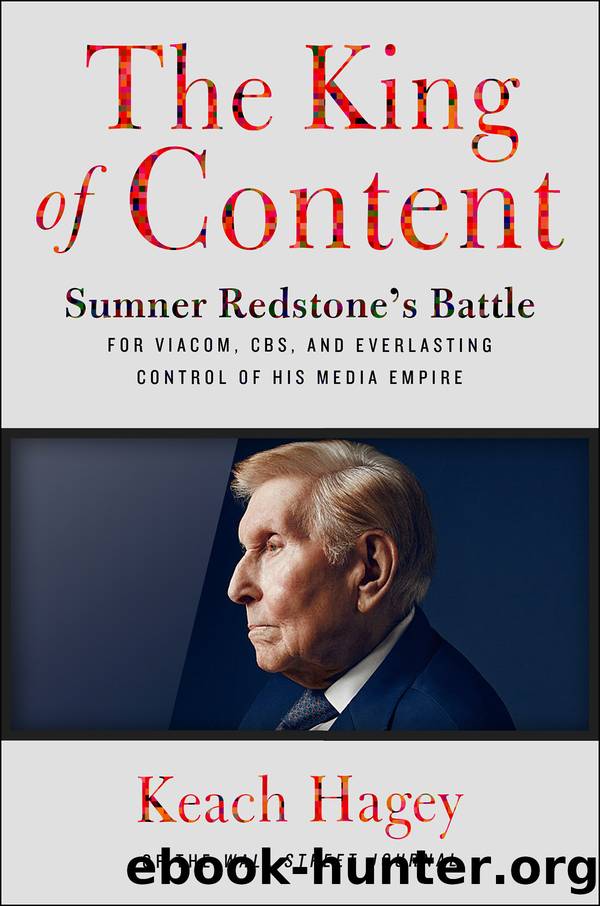The King of Content: Sumner Redstone's Battle for Viacom, CBS, and Everlasting Control of His Media Empire by Keach Hagey

Author:Keach Hagey [Hagey, Keach]
Language: eng
Format: epub
Tags: Biography & Autobiography, Business, Business & Economics, Corporate & Business History, Industries, Media & Communications
ISBN: 9780062654090
Google: IlF7tAEACAAJ
Publisher: HarperCollins
Published: 2018-06-26T20:29:17.650166+00:00
Chapter 16
âThis Is Crazy!â
On Tuesday, August 22, 2006, Tom Freston, now a public company CEO, was taxiing onto the Van Nuys runway in Los Angeles in his new Global Express when his flip phone rang. The stunned voice of Carole Robinson, his head of communications, informed him that Sumner had just given an impromptu interview to the Wall Street Journal declaring that Paramount was firing Tom Cruise, its biggest star, over concerns that his increasingly erratic behavior had dampened the box office for Mission Impossible III. âItâs nothing to do with his acting ability,â Sumner told the Journal. âBut we donât think that someone who effectuates creative suicide and costs the company revenue should be on the lot.â1 Freston, livid, called Sumner.
âThis is crazy!â he said. âFirst of all, you canât fire Tom Cruise, because he doesnât work for us. And even if he did work for us, and if we were going to fire him, it should be done by Brad Grey who runs the studio, not by you, not by me.â Cruise was the cornerstone of the Paramount libraryâwhy would Sumner want to diminish him? Sumner countered that he controlled the company and could do anything he wanted to do. Freston started pacing up and down the aisle, yelling, âYou canât do this! This is bullshit! This is crazy!â
It was their first screaming fight in twenty years of working together, and it was a doozy. Sumner was famous for bellowing at underlings, but he had an almost paternal relationship with Freston, with whom he dined often and considered one of his dearest friends. Back in the 1990s, during Sumnerâs first trip to Asia, Freston had even, at Sumnerâs request, taken Sumner and Delsa around the sex clubs of Bangkok. (The sight of a naked, fornicating couple descending from the ceiling atop a Harley-Davidson would be Sumnerâs first taste of commercial sex but not his last.) But Freston was now in the most famously dangerous job in media: CEO of Sumner Redstoneâs Viacom.
It wasnât going especially well. After all the talk of how Frestonâs side of the company was going to grow fast while Moonvesâs was going to crawl, the opposite had happened: CBSâs stock was up almost 8 percent since the start of the year, while Viacomâs, battered by a sector-wide cable advertising slowdown, was down almost 12 percent. Freston now walked into his office every morning to a stack of angry faxes from Sumner, wanting to know why the stock was down a few cents. His first quarterly earnings surprised investors with a 10 percent decline in profit, in part due to the loss of an advertiser in Germany that Wall Street wasnât expecting, leaving analysts grumbling that Freston could have communicated with them better. And the annual spring âup-frontâ advertising sales season was soft, stoking fears that MTV was losing its youth marketing mojo to upstarts like YouTube.2 By July, just six months into his tenure, analyst Rich Greenfield declared, âIf Mr. Freston cannot swiftly reorient Viacom, Sumner Redstone and the board need to find a new CEO.
Download
This site does not store any files on its server. We only index and link to content provided by other sites. Please contact the content providers to delete copyright contents if any and email us, we'll remove relevant links or contents immediately.
Spare by Prince Harry The Duke of Sussex(4197)
I Have Something to Say by John Bowe(3282)
Harry Potter and the Goblet Of Fire by J.K. Rowling(3045)
Unfinished: A Memoir by Priyanka Chopra Jonas(2918)
Never by Ken Follett(2880)
Greenlights by Matthew McConaughey(2435)
The Man Who Died Twice by Richard Osman(2299)
Machine Learning at Scale with H2O by Gregory Keys | David Whiting(2291)
Fairy Tale by Stephen King(2069)
Will by Will Smith(2042)
Think Again by Adam Grant(1858)
Rationality by Steven Pinker(1765)
The Storyteller by Dave Grohl(1660)
The Dawn of Everything: A New History of Humanity by David Graeber & David Wengrow(1570)
The Dark Hours by Michael Connelly(1570)
The Stranger in the Lifeboat by Mitch Albom(1532)
Invent and Wander by Jeff Bezos & Walter Isaacson(1506)
What Happened to You? by Oprah Winfrey(1472)
Cloud Cuckoo Land by Anthony Doerr(1434)
